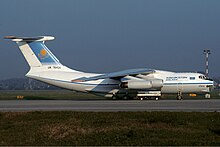Charkhi Dadri mid-air collision
Charkhi Dadri mid-air collision occurred on 12 November 1996 over the village of Charkhi Dadri in Haryana, India. The collision happened between Saudi Arabian Airlines Boeing 747-100B from Delhi to Dhahran (Saudi Arabia) and Kazakhstan Airlines Illyushin II-76 from Chimkent, Kazakhstan to Delhi. There are no survivors among 349 people both airplanes. [1]
| Accident | |
|---|---|
| Date | 12 November 1996 |
| Summary | Mid-air collision due to language barrier and pilot error on Kazakhstan Airlines Flight 1907 |
| Site | Charkhi Dadri, Haryana, India 28°33′38″N 76°18′15″E / 28.56056°N 76.30417°E |
| Total fatalities | 349 (all) |
| Total survivors | 0 |
| First aircraft | |
 HZ-AIH, the Saudi Arabian Airlines aircraft involved in the accident, in early 1980s. | |
| Type | Boeing 747-168B |
| Operator | Saudia |
| Registration | HZ-AIH |
| Flight origin | Indira Gandhi International Airport, Delhi, India |
| Destination | Dhahran International Airport, Dhahran, Saudi Arabia |
| Passengers | 289 |
| Crew | 23 |
| Fatalities | 312 (all) |
| Survivors | 0 |
| Second aircraft | |
 UN-76435, the Kazakhstan Airlines aircraft involved in the accident, in 1994. | |
| Type | Ilyushin Il-76TD |
| Operator | Kazakhstan Airlines |
| Registration | UN-76435 |
| Flight origin | Chimkent Airport, Kazakhstan |
| Destination | Indira Gandhi International Airport, Delhi, India |
| Passengers | 27 |
| Crew | 10 |
| Fatalities | 37 (all) |
| Survivors | 0 |
Accident
change| Nationality | Flight 763 | Flight 1907 | Total | ||
|---|---|---|---|---|---|
| Passengers | Crew | Passengers | Crew | ||
| India | 215 | 0 | 0 | 0 | 215 |
| Nepal | 40 | 0 | 0 | 0 | 40 |
| Russia | 0 | 0 | 14 | 0 | 14 |
| Kyrgyzstan | 0 | 0 | 13 | 0 | 13 |
| Kazakhstan | 0 | 0 | 0 | 10 | 10 |
| United States | 5 | 0 | 0 | 0 | 5 |
| Pakistan | 3 | 0 | 0 | 0 | 3 |
| United Kingdom | 2 | 0 | 0 | 0 | 2 |
| Bangladesh | 1 | 0 | 0 | 0 | 1 |
| Saudi Arabia | 1 | 23 | 0 | 0 | 24 |
| Total | 267 | 23 | 27 | 10 | 327 |
SVA763 (Saudi Arabian Airlines Flight 763 - Boeing 747-100B) departed from Delhi International Airport to Dhahran at 18:35. KZA1907 (Kazakhstan Airlines Flight 1907 - Illyushin II-76) was descending to Delhi airport at the same time. Both flights were controlled by VK Dutta. KZA1907 was cleared to descend 15,000 feet altitude, whereas SVA763 was cleared to climb to 14,000feet. After 8 min, KZA1907 reported that they reached 15000 ft altitude, but they were descending to 14,500 ft at that time and were continuing the descent.
The collision and crash
changeNot noticing it, soon the KZA1907's tail cut through SVA763's left wing. SVA763 lost control and hit the ground at 1135 kmph. The Ilyushin remained structurally intact as it went in a steady but fast and uncontrolled descent until it crashed in a field, killing everyone both airplanes.[2]
Crash site
changeThe collision took place about 100 kilometres (60 mi) west of Delhi. The wreckage of the Saudi aircraft crashed near Dhani village, Bhiwani District, Haryana. The wreckage of the Kazakh aircraft hit the ground near Birohar village, Rohtak District, Haryana.
Investigation
changeThe crash was investigated by the Lahoti Commission, headed by then-Delhi High Court judge Ramesh Chandra Lahoti. The flight data recorders were decoded by Kazakhstan Airlines and Saudi Airlines under the supervision of air crash investigators in Moscow and Farnborough, England, respectively. The commission determined that the accident had been the fault of the Kazakh Il-76 commander, who had descended from the assigned altitude of 15,000 to 14,500 feet (4,600 to 4,400 m) and subsequently 14,000 feet (4,300 m) and even lower. The report says that the cause of this serious problem in operating procedure was due to the lack of English language skills on the part of the Kazakh aircraft pilots; they were dependent entirely on their radio operator for communications with the ATC.[3]
Just a few seconds from impact, the Kazakh plane climbed slightly and the two planes collided. This was because the radio operator of Kazakhstan 1907 discovered only then that they were not at 15,000 feet and asked the pilot to climb.The tail of the Kazakh plane clipped the left wing of the Saudi jet, severing both parts from their respective planes.
Documentaries
changeThe disaster was again the subject of an episode in the documentary series Mayday (TV series) on 2 March 2009 entitled "Sight Unseen", in a wide-screen format with sophisticated computer animations on National Geographic Channel.[4]
References
change- ↑ "India air safety profile". Aviation Safety Network. Archived from the original on 27 May 2014. Retrieved 10 April 2014.
- ↑ "THE INDIAN AIR CRASH: Tapes point blame at Kazakh pilot". The Independent. 14 November 1996. Retrieved 27 February 2014.
- ↑ "Communication gap caused Charkhi Dadri mishap". Rediff. 26 May 1997. Archived from the original on 7 October 1999. Retrieved 4 July 2006.
- ↑ "Haryana India 1996 Plane Crash, Head on Collision". National Geographic Channel. National Geographic Channel. Archived from the original on 11 May 2009. Retrieved 17 April 2009.